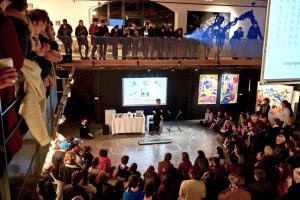
My friend the iguana
March is coming, and I still have to find what I am going to talk about. I had in mind that friend I had during my art university for whom language was a really important topic, central to her work. She left Malaysia when she was 15 to come to France, so what I’m living now she lived it 8 years ago (but I think the cultural shock was much stronger than mine, regarding her age and nationality).
For one of our biggest semestrial work, she made a performance, mixing music (thanks to instruments she made herself), song, participation of the public and a great dose of humour.
So here are some WanQi Gan’s thoughts, extract of here show “OR {dre} CHESTRE”.
Sound and the frontier. We don’t hear the sound of our language anymore.

Performance of OR{dre}CHESTRE during the open day of the exhibition “Nous à feu doux”, Epinal, January 2020
« […] Do we hear the sound of our language? Initially French for me was only sound, the rubbing of teeth against lips, vibrations of vocal cords, air circulating in the oral cavities. (for you too by the way at the start when you were a mass of cells, unconscious flesh that only knew how to express itself by blubbering, all is sound)
As you learn a language, the language takes on meaning and the meaning takes over. Obviously, because meaning is important, meaning is what makes sense, and what makes language. So meaning takes up a lot of space in our language anyway (Well it’s true that meaning is essential, it is primordial, central, it takes up so much space that it covers everything). Now that language has been learned, mastered, domesticated by our thinking, become the tool for our expression and delivery of our intentions on a daily basis, can we still hear the sound of our language? Because hearing is different from recognizing (”reconnaît” in French in the original text), (re-co-nè, verb “to recognize” (in French) conjugated in the third person, or the first, or the second.)à untranslatable joke: Wanqi is joking about the fact that in French this verb is pronounced exactly the same at the 1st, 2nd and 3rd person of singular.
We recognize specific combinations of syllables to form words, for example pha-lli-c, for phallic, for the exact adjective to describe objects with this kind of shape (she shows a cucumber). We recognize the combinations of words to form a sentence differently and a meaning, an intention. So in short, hearing is not the same as recognizing. Can we still hear our language? As sound, rhythms, noises, music? […]”
Foreigners can hear the sound of your language
I heard so many times that French was a wonderful language to hear, like Italian or that German always sounded kind of aggressive. Even if people don’t understand the meaning. And as WanQi said, BECAUSE they don’t understand the meaning they focus on sound. I can’t remember what was my first impression of Croatian (maybe I had the feeling that your sentences were only 1 word, but I think it’s the same feeling for everybody when you don’t have the very basics) but I noticed that people speak with the voice in the deep, with no intonation. So, maybe the best way to hear the sound of a language is to never learn it. Too late for me!
Here are some links leading to the work of my friend WanQi Gan: it’s either in French or Chinese, but you can find some content in English, and anyway art speaks all languages so don’t be shy (:
Her website.
Her Instagram.
Her YouTube channel (she sings).
That’s it for now!
Vidimo se (:
Mathilde

